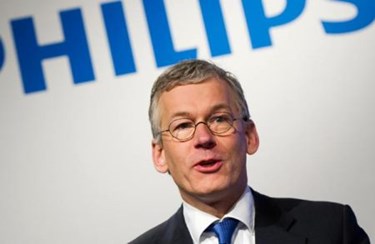Philips CEO: Personalized Healthcare Will Drive Future Growth
By Jof Enriquez,
Follow me on Twitter @jofenriq

Philips reported better-than-expected third quarter earnings on the strong performance of its healthcare and consumer lifestyle businesses, even as the company copes with weakening emerging markets. Sustaining this growth trajectory hinges on the introduction of new personalized healthcare solutions, according to Philips’ top executive.
"Healthcare comparable sales and order intake increased, driven by North America. Operational results also improved year-on-year, despite the impact of China and foreign exchange headwinds. Consumer Lifestyle again delivered a strong performance, with a significant product mix improvement driven by high growth in Health & Wellness and Personal Care," Frans van Houten, CEO, Philips, said in a statement.
Comparable sales increased by 2 percent to €5.8 billion, driven by North America, Asia Pacific, and Central & Eastern Europe businesses, while net income reached €324 million, a turnaround from a net loss of €103 million reported in the third quarter last year, according to the statement.
According to an earnings call transcript by Seeking Alpha, van Houten said Philips' resilience and operational excellence amid its transformation to a health-centric company is making it possible for the company to overcome "continued foreign exchange headwinds and difficult microeconomic conditions in a number of the emerging markets, especially China."
According to van Houten, some 30 percent of Philips' revenue comes from emerging markets, and the company is feeling some pressure. However, he is satisfied with the latest figures despite weakening in China, the Middle East, and Turkey, which he foresees will drag on.
"It will take some time, in my view, before the emerging markets are all back at their historical growth rates. Of course, we see the impact of currency volatility which is difficult to deal with," van Houten said in an interview with CNBC.
Regarding Philips’ Healthcare business, van Houten is pleased with sales growth, positive order intake growth, and improvement in margins during the third quarter. To sustain these positive results in the long-term, however, he said the personalization of healthcare should be an important focus area for the company.
"There is a clear need to drive productivity in Health Systems next to enabling the shift to value-based healthcare aimed at improving clinical and financial outcomes for care providers. In response to this need, we're offering integrated solutions that drive the industrialization and personalization of Healthcare," van Houten said during the earnings call.
As an example of an integrated personalized care solution, he cited the recently-launched Dream Family, a connected positive airway pressure (CPAP) therapy device for obstructive sleep apnea sufferers, which offers personalized coaching tools and connectivity with providers for home-based care. Philips also announced the signing of new vendor service contracts with hospital clients in the United States and Europe.
For Philips’ Consumer Lifestyle business, van Houten reported that the health and wellness and personal care segments both delivered double-digit growth for the third quarter, driven by higher volumes, favorable product mix, and ongoing cost productivity. In particular, Philips’ Oral Healthcare business stood out, with many new products being rolled out in the third quarter.
In addition, van Houten mentioned Philips new personal health programs for consumers, patients and providers. The programs, which were launched in Berlin in September, provide consumers with connected health measurement devices, an app-based personalized program with coaching tools, and secure cloud-based data analysis using Philips' HealthSuite Digital Platform.
By merging the healthcare and consumer and lifestyle business into a single unit called HealthTech, Philips plans to extend its expertise in hospital-based information systems to personalized home-based care solutions. To this end, the company has re-aligned R&D efforts, including making Israel a hub for developing technologies in remote patient assessment and self-monitoring.
According to Philips, the planned separation of its Lighting business is on track to be completed sometime in the first half of 2016. The company is considering either an initial public offering or a private sale for the unit. Because the company focuses on separating the business, it would remain cautious in making large M&A deals, at least in the near-term, according to van Houten. Smaller deals, though, would be considered.
"We have quite a lot on our plate with the separation of Philips Lighting and therefore we will not do anything unexpected on the M&A front," van Houten told analysts, according to the call transcript. “Strategically, we remain interested in bolt-on acquisitions as also elucidated with our capital markets there.”
